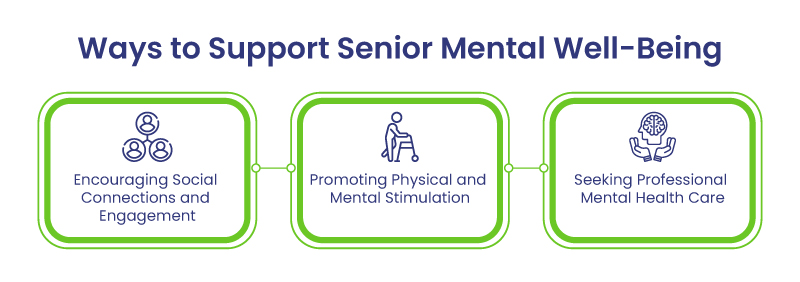Aging brings wisdom and experience, but it also comes with challenges that impact mental well-being. Mental health plays a crucial role in ensuring seniors enjoy a fulfilling, dignified, and independent life. Addressing mental health concerns early can enhance overall well-being and prevent severe conditions from worsening.
Why Mental Health Matters for Aging Adults
The Link Between Mental and Physical Health
Ignoring mental health concerns in seniors can have serious consequences. It may contribute to:
- A decline in immune function makes them more vulnerable to illnesses.
- Increased stress can worsen pre-existing conditions like heart disease or diabetes.
- Difficulty in managing chronic pain or recovering from medical procedures.
- Poor lifestyle habits, such as irregular sleep patterns and unhealthy eating.
By addressing mental health proactively, seniors can enjoy better overall health and an improved quality of life.
Common Mental Health Challenges in Seniors
Depression, Anxiety, and Cognitive Decline
Many aging adults experience depression and anxiety due to changes in lifestyle, health conditions, or the loss of loved ones. Additionally, cognitive disorders such as dementia and Alzheimer’s can impact memory, reasoning, and daily activities.
Signs to watch for:
- Persistent sadness or hopelessness.
- Excessive worry or fear.
- Difficulty remembering things or making decisions.
- Lack of motivation to perform routine tasks.
Loneliness and Social Isolation
Social isolation is one of the most significant challenges for seniors. Many older adults live alone or have limited social interactions, leading to feelings of loneliness, which can negatively affect their mental and physical health.
Effects of loneliness on mental health:
- Increased risk of depression and anxiety.
- Higher chances of developing dementia.
- Reduced motivation to engage in daily activities.
Encouraging social interaction and emotional support can significantly improve a senior’s mental health and overall quality of life.
Recognizing When a Senior Needs Mental Health Support
Changes in Mood or Behavior
Sudden mood swings, increased irritability, or withdrawal from loved ones can indicate mental health struggles. Other warning signs include:
- Frequent confusion or forgetfulness.
- Unexplained weight loss or poor appetite.
- Trouble sleeping or excessive fatigue.
Loss of Interest in Activities and Social Withdrawal
If a senior loses interest in hobbies they once enjoyed or avoids social interactions, it could be a sign of depression or anxiety. Early intervention is crucial to prevent their condition from worsening.
Ways to Support Senior Mental Well-Being
Encouraging Social Connections and Engagement
Regular social interactions help seniors maintain emotional stability and cognitive function. Some ways to foster connections include:
- Engaging in meaningful conversations with loved ones through phone or video calls.
- Participating in community activities or senior social groups.
- Spending quality time with family members to strengthen relationships.
Promoting Physical and Mental Stimulation
Staying physically and mentally active can prevent cognitive decline and boost emotional well-being. Some effective activities include:
- Light exercises like walking, yoga, or stretching.
- Puzzles, reading, or brain-training games to enhance cognitive function.
- Music, art, or other creative therapies for emotional expression.
Seeking Professional Mental Health Care
Professional support plays a crucial role in addressing mental health challenges. Seniors struggling with severe emotional distress may benefit from:
- Therapy or counseling sessions.
- Medication (if prescribed by a healthcare provider).
- Support groups for individuals experiencing similar challenges.
How PapayaCare Supports Senior Mental Health
Personalized Care and Emotional Well-Being Programs
At PapayaCare, we prioritize mental health by offering:
- Personalized care plans tailored to individual emotional and psychological needs.
- Compassionate caregivers trained to provide emotional support.
Social Engagement and Therapeutic Activities
We create a nurturing environment that fosters social connections through:
- Group activities and community events.
- Cognitive therapy sessions to promote memory and brain function.
- Meditation, music therapy, and other stress-relieving practices.
You may like to read this: Mental Health Care Services for Older People
Conclusion
Ensuring mental health support for aging adults is essential for their overall well-being. Recognizing early signs, promoting social engagement, and seeking professional care can make a significant difference in their quality of life.
At PapayaCare, we are dedicated to providing compassionate and holistic care to enhance the mental health of seniors.
Contact us today to: Explore PapayaCare’s Senior Mental Health Care Services

















